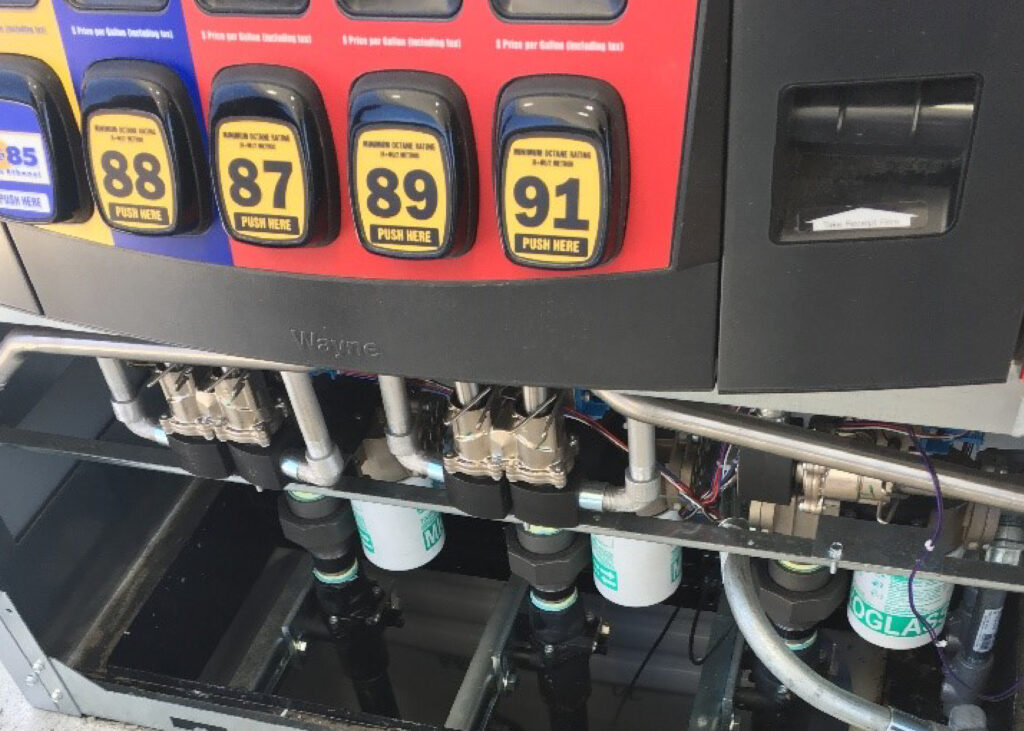
Why Are My Pumps Running Slow?
Slow flow at your station can be caused by multiple circumstances, including both equipment and setup. The first step in diagnosing your issue is verifying there are no leaks in the system. If no leaks are present, other common causes of slow flow are described below. As always, for any service-related issues where you may lack specific training or comprehensive knowledge, we recommend working closely with your service provider to complete a full diagnostic of your system.
Fuel Filters
The most common cause of slow flow is clogged filters. Filters can clog due to the age of the filter. Although filters do not have a shelf life, as a general rule they should be changed once per calendar year. If you dispense over 100,000 gallons per month, we recommend changing filters every 6 months. This simple and routine maintenance item can help prevent larger issues from an aged filter. Filter issues may be more pronounced when a customer is fueling, and you are receiving a fuel delivery at the same time.
Clogged filters can also stem from a dirty tank. If you are frequently changing your fuel filters, it may be a sign that your tanks need cleaned. This sometimes-costly service involves using a high-powered water jet that circulates water around the tank, while a vacuum tank removes the contaminates and loose debris.
Diesel filters that clog quickly may indicate that you have an algae issue with your fuel. Algae will look similar to rust on the top of the old filter; if caught early, your fuel provider can usually treat the fuel. Generally, if you adhere to a regular fuel filter maintenance schedule, your problem will subside over time. If the issue goes untreated, you may be required to treat the fuel and have the diesel tank polished and cleaned to remedy the problem.
Two of the best ways to ensure adherence to filter maintenance schedules are to take advantage of an auto-ship feature with your filter provider and use of a compliance management system to track and send reminders when maintenance dates are near.
Submerged pumps and Mechanical Leak Detectors
Second to fuel filters being the cause of slow flow, use of submerged pumps and mechanical leak detectors are also problematic. If you have an issue with your pumps running extremely slow (such as a penny at a time), you may have a mechanical leak detector in your UST system. In this case, you should first check dispensers and sub-unit manways to verify there is not a physical leak. If no leaks are visible, the problem could be caused by a major fluctuation in temperature where the pressure in the line could drop due to fuel shrinkage. Other internal check valve issues inside the submersible pump can also be the cause of pressure drops.
Over time, mechanical leak detectors can fail, causing systems to go into slow flow even when there is no pressure drop. This may be remedied by starting the pump and allowing it to re-pressurize the system and run its leak test. Be sure no one is dispensing fuel during this process. If re-pressurizing does not remedy the problem, further diagnostics of your leak detectors should be completed by a service provider.
Pump and Suction Systems
Slow flow can also occur due to the age and condition of the pump itself. There are rarely any warning signs that a submerged pump is going bad; typically, only a trained technician can diagnose when a pump is losing its power or the rotors are going bad, thus causing slow flow issues.
Suction systems generally have a separate line to the tank for each fueling dispenser. If you have one dispenser that has an issue with slow flow, it could be related to the line or the pumping unit in that dispenser. If all dispensers at a suction site are having issues, it is likely a problem with the tank itself needing to be cleaned. Not all suction dispensers have filters, but all should have at least a screen for the fuel. Other factors that can arise might include loose fittings causing air leaks or internal issues with the pumping unit itself. Consult your petroleum service provider regarding pump and suction systems diagnostics; some assistance may be provided over the phone, or a service call may be needed.
Evora Petroleum Solutions is your partner for dispenser and pump diagnostic. We service all major dispensers including Wayne and Gilbarco. Our knowledgeable technicians are trained to work on all aspects of your fueling system including completing service work on newly installed equipment under manufacturer’s warranty. Our complete compliance management system can notify you of important dates such as inspections and routine maintenance needs, or you can setup reoccurring shipment or service calls with our Petroleum Service Coordinator to keep your pumps running smooth and fast! Connect with us 515-256-8814.
